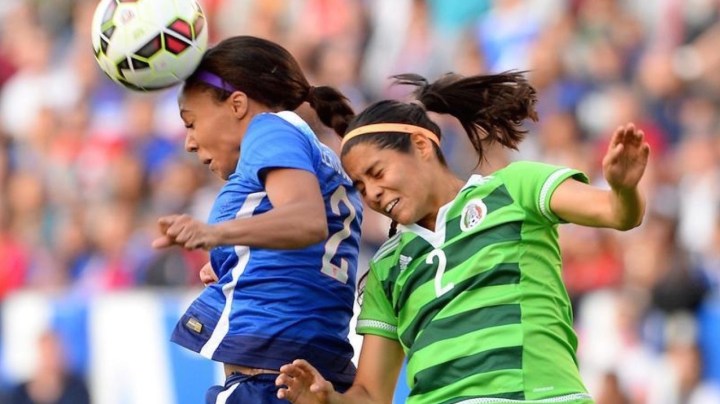Futbolista Mexicana Kenti Robles Signs With Atlético de Madrid

Atlético de Madrid Féminas announced the signing of Kenti Robles on a one-year deal, confirming that the Mexican right back “ya es rojiblanca”. At the youthful age of 24, she joins the colchoneras with experience beyond her years, a seasoned veteran of Spain’s Primera División Femenina who seems more than ready and eager to continue to grow under the guidance of coach Miguel Ángel Sopuerta.
Robles’ move comes after eight seasons with RCD Espanyol, where her Spanish journey began in 2003. A part of the club’s youth academy for six years, she was promoted to first team action in 2009, and proceeded to win her first title– the Copa de la Reina– that same year.

After competing with La Tri Femenina in the 2011 World Cup and taking bronze at the 2011 Pan American Games, Robles decided to switch allegiances and join the ranks of cross-city rival FC Barcelona Femenino. Her move directly coincided with Barça’s golden age, as they took part in the UEFA Women’s Champions League and secured three straight league titles from 2011 to 2014. In August 2014, she returned home for an additional season of club play with Espanyol.
Much to Robles’ surprise, her transfer to Atléti has been met with excitement and interest from a great number of football fans, perhaps signaling a collective change in opinion towards women’s football following the 2015 World Cup. The fact that Mexico was one of the tournament’s biggest disappointments adds an extra element of surprise to the equation: La Tri’s 0-2-1 performance– including a 1-1 tie vs. Colombia, 2-1 loss vs. England, 5-0 drubbing vs. France, and three full 90s from Robles– was unfortunately not the most awe-inspiring of exploits, but the support that Robles has received despite this fact does bode well for the future.
What remains to be seen is if and when this growing excitement and interest will be channeled into meaningful attempts to combat the inherent sexism that pervades the world of soccer and diminishes these women’s abilities to succeed beyond the World Cup spotlight. One need not look past the disparity in coverage between the men’s and women’s game to see gender inequality at work, but if you are looking for other examples, the discrepancy in prize money and the longevity of Leonardo Cuellar and Ignacio Quereda’s careers at the helm of the Mexican and Spanish women’s national teams respectively are worth noting. In Spain (as is arguably the case in many other countries) the women’s game suffers from a persistent and deep rooted paternalism that is most evident in the Real Federación Española de Fútbol’s almost unfathomable lack of interest in aiding grassroot development or providing any monetary support for Robles and the other women honing their craft in the country.
In an interview with MedioTiempo following her move to Atléti, Robles stated that women have always been in the background, but that now is the time to take a stand, say that women are here, and start to make sure that their opportunities are growing at an equal rate, because “el fútbol es para mujeres” too.
Robles plans to join her Atléti teammates for the 2015-16 season– which will mark their debut in the Champions League– after competing in her second major tournament of the summer with Mexico in Toronto at the 2015 Pan American Games. La Tri face Trinidad and Tobago in their third match of the competition on Saturday.